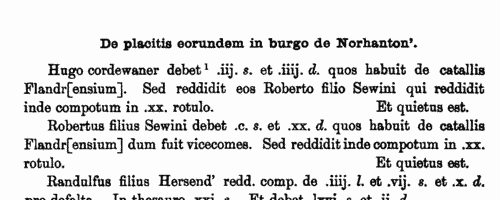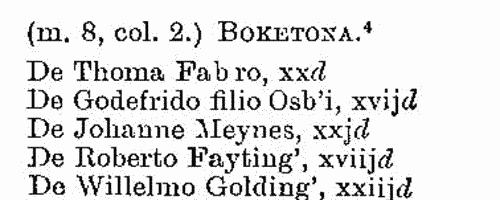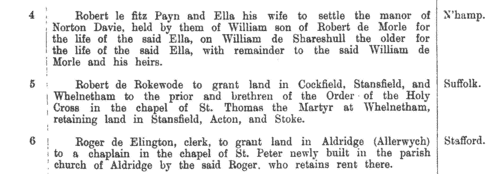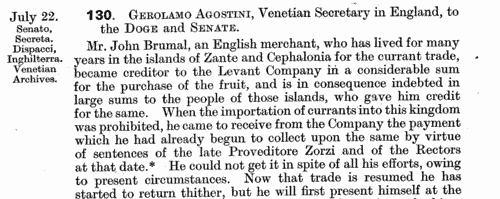Scort Surname Ancestry ResultsOur indexes 1000-1999 include entries for the spelling 'scort'. In the period you have requested, we have the following 4 records (displaying 1 to 4):
Buy all | |
| Get all 4 records to view, to save and print for £20.00 |
These sample scans are from the original record. You will get scans of the full pages or articles where the surname you searched for has been found.
Your web browser may prevent the sample windows from opening; in this case please change your browser settings to allow pop-up windows from this site.
Grantees of royal lands and pardons
(1175-1176)
The Great Rolls of the Pipe are the central record of the crown compiling returns of income and expenditure from the sheriffs and farmers of the various English counties or shires. This is the oldest series of public records, and the earliest surviving instances of many surnames are found in the Pipe Rolls. This is the roll for the 22nd year of the reign of king Henry II, that is, accounting for the year from Michaelmas 1175 to Michaelmas 1176. Most (but not all) of the entries in which names appear relate to payments for grants of land and fines or pardons. The large number of payments of fines for forest transgressions has been interpreted as a form of compounding for pardons by those who had rebelled during the recent years of unrest; or, looking at it in a different way, a form of extortion from the king in order to raise money to pay off the mercenaries with whose help he had quelled the rebellions. There is a separate return in each year for each shire, the name of the shire being here printed at the top of each page. Wales was still independent, in separate kingdoms, at this period, and is not included, except for 'Herefordshire in Wales'. SCORT. Cost: £4.00.  | Sample scan, click to enlarge

|
Inhabitants of Yorkshire
(1297)
Taxation roll of the lay (non-clergy) inhabitants of Yorkshire from the 25th year of the reign of king Edward I. LatinSCORT. Cost: £6.00.  | Sample scan, click to enlarge

|
Landowners and tenants in Norfolk
(1345-1485)
Inquisitions ad quod damnum were held by the appropriate sheriff or escheator (or other officer in whose bailiwick the matter in question might lie) to investigate cases in which the royal or public interest might be damaged by proposed alienation or settlement of land (especially alienation to religious uses, into mortmain). The key findings from these inquisitions were as to the tenure of the land and the service due from it; its yearly value; the lands remaining to the grantor, and whether they sufficed to discharge all duties and customs due from him; and whether he can still be put upon juries, assizes and recognitions, so that the country be not burdened by his withdrawal from them. Generally speaking, this process had the makings of a system of licensing such alienations, and raising money in proportion to the valuations. Equally, there are many items that deal with subjects such as the closing of public roads, the felling or inclosing of woods, or the proposed grant of liberties or immunities. A calendar of these inquisitions from the 19th year of the reign of king Edward III to the 2nd year of Richard III was prepared by the Public Record Office and published in 1906. We have now indexed this calendar by surname and county. Most of the individuals appearing in the calendar are either pious individuals seeking to make grants to religious bodies for the sake of their souls; or landowners securing the disposition and settling of their real estate. But some other names do appear - tenants, trustees, chaplains and clerks.SCORT. Cost: £6.00.  | Sample scan, click to enlarge

|
England and Venice
(1643-1647)
The Master of the Rolls directed the compilation of translations of archives from northern Italy relating to English affairs. This volume, edited by Allen B. Hinds and published in 1926, is largely based on transcripts in the Public Record Office in London of major sources from the Venetian archives, in particular the Dispacci, Inghilterra. Most of this volume consists of the letters of Secretary Agostini from London, the Advices of London forwarded from Paris, and the Esposizioni Principi; and as such contain descriptions of unfolding political events in Britain as seen by Italian diplomats. But there were also Englishmen actively trading with Venice and its sphere of influence in the eastern Mediterranean: Venice was struggling with the Turks for possession of Candia (Crete), and English merchants, mercenaries and ships were involved on both sides. There is even the report of a raid by Barbary pirates on the Cornish coast in which 200 women were carried off for slaves.SCORT. Cost: £4.00.  | Sample scan, click to enlarge

|
Research your ancestry, family history, genealogy and one-name study by direct access to original records and archives indexed by surname.






